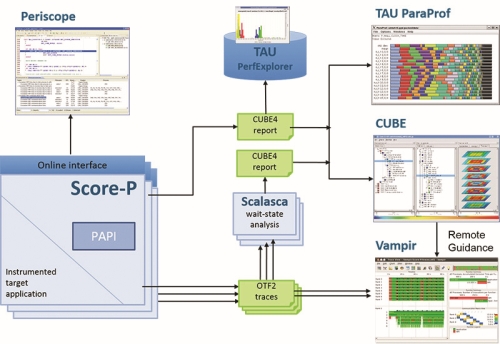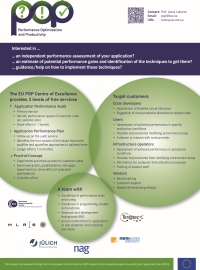The rapid evolution of the complexity and heterogeneity of HPC infrastructures imposes to modernize the code of compute intensive applications. Failing this, these applications will not only be unable to fully exploit the compute power of such infrastructures, but will also possibly obstruct concurrent applications, and cause energy waste.
Code modernization is not an easy task and applications developers, who are expert in their domain of application, naturally focus their effort on extending or enhancing the features of their applications rather than adapting and optimizing them as long as these applications run without failure. That is why the POP partners proposed to the European Commission to create a Center of Excellence that will provide performance analysis services.
These services are targeted to any types of customer: large or small industrial company, research center, or university lab, and for open source as well as proprietary software.
The performance analysis will be made on the customer’s infrastructure with tools such as Paraver, Dimemas, Scalasca, Vampir, SimGrid, etc. with which the POP experts are familiar (BSC and JSC, in particular, have developed and continue to enhance their respective tools and associated method, in the framework of other cooperation projects, while contributing to world-wide standardization committees to evolve programming models such as MPI and OpenMP). Moreover, most POP partners are running large HPC infrastructures in the framework of PRACE (Partnership for Advanced Computing in Europe) and support efficiently the users that are granted access to their infrastructure. Roughly speaking, customers will submit requests for application audit, the POP experts will have the application audited with appropriate performance analysis tools, then will study the output traces, and identify the types of code modification that are required to solve identified performance problems. In some cases, the proposed modifications of code will be demonstrated, as a proof-of-concept, on a representative part of the code, but in any case, the role of the POP experts is to make recommendations that the applications owners should implement by themselves on the whole code. To help the customers, various training courses will be proposed either to enable them to run performance analysis tools, to interpret the traces they generate, and/or to identify the type of code modifications that would make the application more efficient.
And finally, a customer satisfaction survey will be systematically made with a questionnaire, possibly followed by an interview of the customer in order to measure the quality of the services rendered by POP, and to identify possible improvements of the quality and efficiency of these services, so that in the end (after the project) the POP center of Excellence becomes self-reliant, competitive and viable without subsidization.
The performance improvement of the applications will make research and industry more productive (less waste of time and energy), will increase the quality of their results, and so will make research and industry more competitive.
 |
Started 1st of October 2015, this project already set up its working infrastructure, in particular, its web site http://www.pop-coe.eu to which any developer in charge of an HPC application which is likely suboptimal is invited to connect, to register as customer (the service is free during the 30 months of the POP project), and to describe the applications he/she thinks should be audited.
A set of candidate applications have already been registered by EoCoE (Energy Oriented Centre of Excellence for computing applications) and a work plan is being established to treat them; several code audits have already been achieved by BSC; a training course has been given by JSC; the marketing material (flyer, presentation, business card) has been created and used by POP representatives at SC15 (Supercomputing Conference in Austin – Nov. 2015); and all deliverables due by end of December 2015 have been done.
On its side, Teratec, which is responsible for WP2 – Customer Advocacy, already produced a first version of the customer satisfaction questionnaire, and proposed to organize 4 forums (one per semester and one per country represented in the POP project) which will permit to gather together customers and POP experts. This Customer Advocacy task will be made jointly with INRIA which participates to POP as a Third Party associated to Teratec.
Teratec is also responsible for a contribution in , which is delegated to CNRS, another Third Party associated to Teratec. This contribution consists in making performance simulation using the SimGrid technology.
And finally, Teratec, which is at the heart of the network of French and European HPC actors, is naturally in charge of an important part of the communication and dissemination activity.
 |

